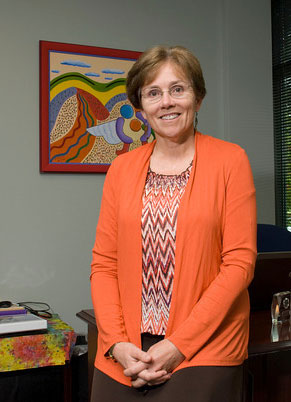By Jeff Brumley
There are plenty of Catholic, Episcopal, Lutheran and Methodist churches in Dayton, Ohio, where parents could have an infant child baptized.
But one local couple wanted Rodney Kennedy to baptize their 7-month-old son, even though they knew there was one hurdle to overcome: Kennedy is pastor at First Baptist Church in Dayton.
And Baptists — both generally and specifically — do not baptize infants.
“We knew that asking Rod, he might say no,” said Lucas, the boy’s father who requested only his first name be used in this article.
But Kennedy did not say no, and during worship on Sunday, April 19, he conducted his and his church’s first-ever infant baptism.
“And the congregation burst into applause,” Kennedy told Baptist News Global. “And they don’t applaud much.”
But the time between the request and Kennedy’s “yes” was filled with a month of prayer and discussion between the pastor and leaders of the American Baptist Churches USA congregation.
And informing all of that has been years of increasingly liturgical practice for the church and Kennedy, who describes himself as “somewhat Catholic-Baptist.”

“I already accepted the validity of infant baptism and we don’t make people get baptized” if they were baptized as infants before joining First Baptist, he said.
Since that’s been the church policy for 50 years, Kennedy said it made sense for him to participate in the practice, too.
Even so, Kennedy said the rite had a different feel to it than most baptisms.
“There was an overpowering sense that this was the right thing to do, and there was a sense of God’s presence there,” he said. “It was just a really high and holy moment.”
Only two people have sent him emails outlining traditional Baptist teaching on baptism, he added.
A communal act
The baby’s parents were more than familiar with those teachings. Neither grew up Baptists, but both belonged to traditions that held strongly to the practice of believer’s baptism, Lucas said.
Moving on from those churches to ones with liturgical practices led them to First Baptist. The congregation hosts a number of liturgical services and practices.
“A lot of times when people think about baptism, their first thoughts are about the individual and their salvation — the individual getting to heaven,” he said. “But there is much more about baptism than that.”
Baptism is a communal act through which one is claimed by God into the church as the body of Christ, he said.
More than a symbol
Baptist theologian Beth Newman said she hopes Kennedy’s action will spark conversations in Baptist and wider Christian life about those deeper meanings of Baptism.
“As Christians, we want to say baptism is this one event, but it’s also a way of life,” said Newman, a professor of theology and ethics at Baptist Theological Seminary at Richmond.
That was also Newman’s goal in contributing a chapter on baptism in Gathering Together: Baptists at Work in Worship, a 2013 book co-edited by Kennedy.
She wanted to help Baptists see baptism as more than “just a symbol” and to avoid dismissing sacramental views of baptism as Catholic.

“I would say you cannot be baptized apart from the community,” Newman said. “We are baptized into the community — not just into a congregation — but into the whole church.”
Kennedy is the first Baptist pastor Newman said she’s known to baptize and infant. By far, believer’s baptism is the norm among Baptists.
However, many also recognize the need to bring infants into the church.
“A lot of Baptist churches [are doing] baby dedications, which are a way of welcoming the child into the family — though not the membership — of the church,” she said.
Newman said most of the conversations about baptism she’s heard occur in forums hosted by organizations like the Baptist World Alliance.
“It’s not so much in the local congregations,” she said.
But the infant baptism at First Baptist Church in Dayton may help change that.
“Let’s try to talk so we can … understand the richness that baptism has for all of us,” she said.
Moving closer
There was a lot of that kind of discussion at First Baptist for weeks before Kennedy’s decision to go ahead with the baptism.
One topic included the church’s policy, for the past five decades, to welcome new adult members who had been baptized as infants in other traditions — and without re-baptizing them.
They also agreed the Baptist norm is valid and biblical. Kennedy said he is not trying to change that approach but to open a new chapter.
“I want to move closer to the ecumenical fellowship of the Christian church and by accepting infant baptism, and then practicing it, we are not set off from Presbyterians and Methodists and Catholics,” Kennedy said.
Kennedy said he turned down another request for an infant baptism because the parents weren’t members of First Baptist, or willing to join.
That highlights another facet of the his view about infant baptism.
“The purpose of this baptism is for parents to make serious promises and for God to claim him in his grace-filled Kingdom,” Kennedy said. “Baptism is just the beginning of a lifetime process.”
‘A disciple of Jesus’
Those promises include a vow to raise the child in the Christian faith and to renounce evil. The text of the ceremony came from the Book of Common Prayer.
Parents unwilling or unable to make those commitments will not have their infants baptized at First Baptist, Kennedy said.
“It won’t be our normative practice,” he said. “But it is an open possibility for parents if they request it.”
Last Sunday, Kennedy held the infant over a small bowl of warm water, used his hands to cup and pour the water over the baby’s head. He also anointed the child with oil and made the sign of cross on his forehead in name of Father, Son and Holy Spirit.
“Our decision was that whether the baptism or the confession of faith comes first, doesn’t matter,” he said. “Either way you end up with a person who is a disciple of Jesus.”
